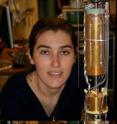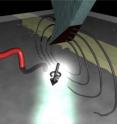UC Santa Barbara researcher's new study may lead to MRIs on a nanoscale
Magnetic resonance imaging (MRI) on the nanoscale and the ever-elusive quantum computer are among the advancements edging closer toward the realm of possibility, and a new study co-authored by a UC Santa Barbara researcher may give both an extra nudge. The findings recently appeared in Science Express, an online version of the journal Science.
Ania Bleszynski Jayich, an assistant professor of physics who joined the UCSB faculty in 2010, spent a year at Harvard working on an experiment that coupled nitrogen-vacancy centers in diamond to nanomechanical resonators. That project is the basis for the new paper, "Coherent sensing of a mechanical resonator with a single spin qubit."
A nitrogen-vacancy (NV) center is a specific defect in diamond that exhibits a quantum magnetic behavior known as spin. When a single spin in diamond is coupled with a magnetic mechanical resonator -- a device used to generate or select specific frequencies -- it points toward the potential for a new nanoscale sensing technique with implications for biology and technology, Jayich explained.
Among those possible future applications of such a technique is magnetic resonance imaging on a scale small enough to image the structure of proteins -- an as-yet unaccomplished feat that Jayich called "one of the holy grails of structural biology."
"The same physics that will allow the NV center to detect the magnetic field of the resonator, hopefully, will allow MRI on the nanoscale," Jayich said. "It could make MRI more accurate, and able to see more. It's like having a camera with eight megapixels versus one with two megapixels and taking a picture of someone's face. You can't see features that are smaller than the size of a pixel. So do they have three freckles, or do they all look like one big freckle?
"That's the idea," Jayich continued. "To resolve individual freckles, so to speak, to see what a protein is made up of. What we found in this paper suggests that it is possible, although a significant amount of work still needs to be done."
Though further into the future based on the approach used for this paper, Jayich said, there is also the potential for such a coupling to be advanced and exploited as a possible route toward the development of a hybrid quantum system, or quantum computer.
Jayich collaborated on the project with researchers Shimon Kolkowitz, Quirin Unterreithmeier, Steven Bennett, and Mikhail Lukin, all from Harvard; Peter Rabl, from the Institute for Quantum Optics and Quantum Information of the Austrian Academy of Science; and J.G.E. Harris, from Yale. The work was supported in part by the National Science Foundation, the Center for Ultracold Atoms, and the Packard Foundation.
Source: University of California - Santa Barbara
Other sources
- MRIs on a nanoscale?from Science DailyFri, 24 Feb 2012, 3:30:17 UTC
- New study may lead to MRIs on a nanoscalefrom PhysorgThu, 23 Feb 2012, 21:30:50 UTC

